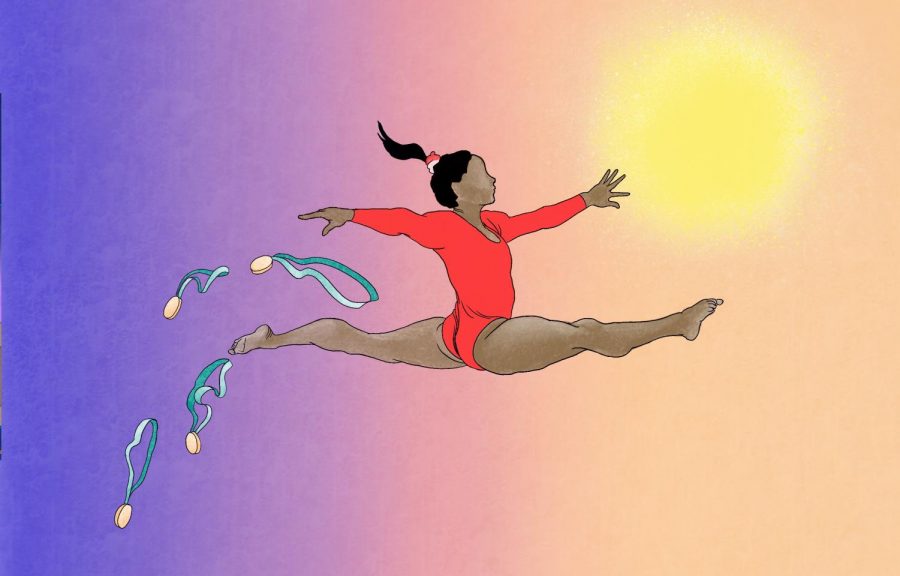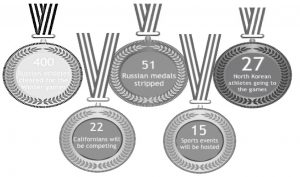Power of choice: Olympians set example of strength in making healthy decisions
On the final day of the Olympics, seven days after she last appeared in the arena, Simone Biles returned to compete on the beam, not expecting to receive an award and saying “I was just going out there doing this for me.” Just like Biles, you have the power of choice—the power to sacrifice immediate results to take care of your well-being and to pave the way for long-term fulfillment.
August 15, 2021
“It doesn’t matter what vault she does—it’s a showstopper,” said a NBC Sports reporter in a live broadcast. Eyes focused ahead, Simone Biles set off in a sprint, jumped from the springboard and launched off the vaulting table into the air. But instead of a dizzying blur of limbs, she completed just one and a half unexpectedly slow twists and landed on shaky legs, lunging out to the side in an attempt to regain balance and grimacing.
When the four-time Olympic gold medalist pulled out of the 2020 Tokyo games after her vault stumble on Jul. 27, Biles set the Internet ablaze. Commentators such as conservative talk show host Charlie Kirk deemed her weak, denouncing her so-called abandonment of her team.
Biles described her situation during the vault as “having a little bit of the twisties,” a term used by gymnasts to describe losing control of their bodies midair, which leads to a disconnect between the body and mind. She dropped out of the competition to protect her body from the potentially devastating effects of a mental block after consulting medical staff. Despite her departure from the team, she continued to cheer on her teammates in the arena, providing them hugs, encouragement and chalk for their hands.
In spite of her critics’ stance on her decision, Biles doesn’t need to prove her strength: she—as well as several other prominent gymnasts—suffered sexual abuse by team doctor Larry Nassar and continued to compete while recovering from the trauma. Besides becoming the world’s most decorated gymnast with 25 World medals and 7 Olympic medals through years of training and astounding performances, she powered through the 2018 National Championships with a broken toe and through the World Championships later that year with a kidney stone—it’s no question Biles can push her boundaries. This time, she’s setting them.
the outpouring love & support I’ve received has made me realize I’m more than my accomplishments and gymnastics which I never truly believed before. 🤍
— Simone Biles (@Simone_Biles) July 29, 2021
In addition to the outpour of support for Biles from various athletes through social media, other Olympians are also exercising the power of choice and prioritizing their mental health, even if it means breaching athletic traditions and expectations. Global tennis player Naomi Osaka withdrew from the French Open in June and chose to stop partaking in post-match press conferences, citing her social anxiety and the self-doubt elicited by the barrage of questions from reporters. WNBA player Liz Cambage left the Australian team to recover from anxiety over being in a “bubble Olympics” without her family, friends and fans due to COVID restrictions. Dutch cyclist Tom Dumoulin stepped back from the sport in January after feeling “a little lost” and only returned to training four months later.
While not all of us are Olympic athletes, Biles and others can teach us about knowing our limits. In the competitive culture of the Bay Area, nobody bats an eye at loading up on AP courses, sports, leadership roles and extracurriculars—we celebrate hard work but also unknowingly praise workaholism. In many competitive environments, people are taught to value results and endure anything that comes their way to achieve their goals.
While perseverance continues to be an integral skill, we shouldn’t confuse it with overworking: push yourself but not all the way until you break. If growth is unsustainable, recognize when to slow down, even if it means putting off your goals until you’re in the right headspace. To overcome burnout, Forbes recommends taking a break to recalibrate—slowing down gives you time to reflect on motivation and understand your limits to prevent the detrimental cycle from repeating itself.
On the final day of the Olympics, seven days after she last appeared in the arena, Biles returned to compete on the beam, not expecting to receive an award and saying “I was just going out there doing this for me.” As the broadcast camera focuses on her, she exhales and sets her hands on the beam to hoist herself up, and applause-filled moments later, she lands her dismount with a radiant smile.
Beating out tight competition in the individual finals, Biles won the bronze medal. In a similar fashion, despite his lengthy respite from biking, Dumoulin won silver in the men’s individual time trial. Their awards illustrate the importance of prioritizing mental health and that success often follows a period of rest and reflection.
Just like Biles, you have the power of choice—the power to sacrifice immediate results to take care of your well-being and to pave the way for long-term fulfillment.


















![“[Building nerf blasters] became this outlet of creativity for me that hasn't been matched by anything else. The process [of] making a build complete to your desire is such a painstakingly difficult process, but I've had to learn from [the skills needed from] soldering to proper painting. There's so many different options for everything, if you think about it, it exists. The best part is [that] if it doesn't exist, you can build it yourself," Ishaan Parate said.](https://harkeraquila.com/wp-content/uploads/2022/08/DSC_8149-900x604.jpg)




![“When I came into high school, I was ready to be a follower. But DECA was a game changer for me. It helped me overcome my fear of public speaking, and it's played such a major role in who I've become today. To be able to successfully lead a chapter of 150 students, an officer team and be one of the upperclassmen I once really admired is something I'm [really] proud of,” Anvitha Tummala ('21) said.](https://harkeraquila.com/wp-content/uploads/2021/07/Screen-Shot-2021-07-25-at-9.50.05-AM-900x594.png)







![“I think getting up in the morning and having a sense of purpose [is exciting]. I think without a certain amount of drive, life is kind of obsolete and mundane, and I think having that every single day is what makes each day unique and kind of makes life exciting,” Neymika Jain (12) said.](https://harkeraquila.com/wp-content/uploads/2017/06/Screen-Shot-2017-06-03-at-4.54.16-PM.png)








![“My slogan is ‘slow feet, don’t eat, and I’m hungry.’ You need to run fast to get where you are–you aren't going to get those championships if you aren't fast,” Angel Cervantes (12) said. “I want to do well in school on my tests and in track and win championships for my team. I live by that, [and] I can do that anywhere: in the classroom or on the field.”](https://harkeraquila.com/wp-content/uploads/2018/06/DSC5146-900x601.jpg)
![“[Volleyball has] taught me how to fall correctly, and another thing it taught is that you don’t have to be the best at something to be good at it. If you just hit the ball in a smart way, then it still scores points and you’re good at it. You could be a background player and still make a much bigger impact on the team than you would think,” Anya Gert (’20) said.](https://harkeraquila.com/wp-content/uploads/2020/06/AnnaGert_JinTuan_HoHPhotoEdited-600x900.jpeg)

![“I'm not nearly there yet, but [my confidence has] definitely been getting better since I was pretty shy and timid coming into Harker my freshman year. I know that there's a lot of people that are really confident in what they do, and I really admire them. Everyone's so driven and that has really pushed me to kind of try to find my own place in high school and be more confident,” Alyssa Huang (’20) said.](https://harkeraquila.com/wp-content/uploads/2020/06/AlyssaHuang_EmilyChen_HoHPhoto-900x749.jpeg)










